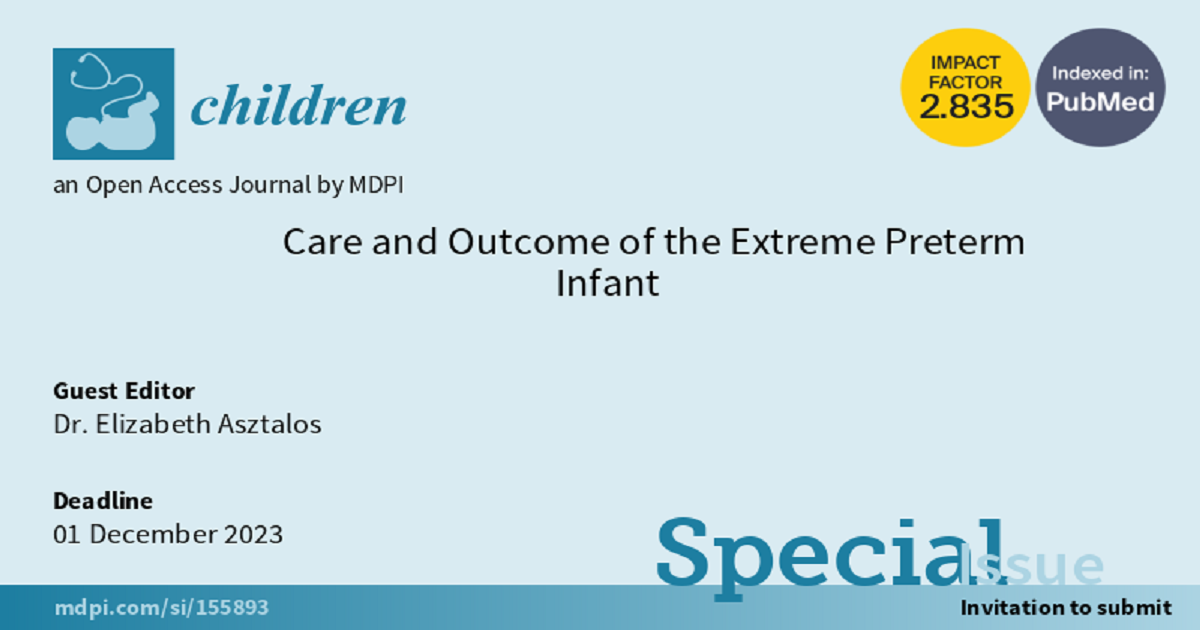Care and Outcome of the Extreme Preterm Infant
A special issue of Children (ISSN 2227-9067). This special issue belongs to the section "Pediatric Neonatology".
Deadline for manuscript submissions: closed (10 November 2024) | Viewed by 18973

Special Issue Editor
2. Department of Paediatrics, University of Toronto, Toronto, ON M5A 1B2, Canada
Interests: neonatal care; neurodevelopmental outcomes; clinical trials; feeding and nutritional support
Special Issues, Collections and Topics in MDPI journals
Special Issue Information
Dear Colleagues,
Over the last 10–20 years, there have been significant gains in the care of preterm infants at less than 30 weeks of gestation. We have been able to improve our skill set in the fields of respiratory and hemodynamic management so that neonatal morbidity is steadily declining in overall incidence for preterm infants, particularly in infants at 28–29 weeks of gestation. As we become more proficient in the care of these infants, we begin to translate these skill sets for the more extreme preterm infants, those at <26 weeks of gestation but most importantly the infants born below 24 weeks of gestation. These infants are not only preterm but are also physiologically immature, which adds a dimension in their care and ultimate survival. It is now important to share how we can optimize survival but also ensure that there are positive outcomes both in neonatal morbidities and neurodevelopmental outcomes. How these very extreme preterm infants traverse the neonatal pathways will play a significant role in how they are able to develop as a functioning child. The traditional outcomes of death, cerebral palsy, vision and hearing deficits, and cognitive deficits may not be adequate in evaluating how these extreme preterm infants present post-discharge. We need to go beyond theses traditional outcomes and look at functional outcomes as we explore our ongoing approaches in care. In addition, we need to explore how parents use coping skills in the 20–30 weeks of neonatal care their infants may have.
I hope that this Special Issue will be an opportunity to look at how we can optimize care for these infants and their parents.
Dr. Elizabeth Asztalos
Guest Editor
Manuscript Submission Information
Manuscripts should be submitted online at www.mdpi.com by registering and logging in to this website. Once you are registered, click here to go to the submission form. Manuscripts can be submitted until the deadline. All submissions that pass pre-check are peer-reviewed. Accepted papers will be published continuously in the journal (as soon as accepted) and will be listed together on the special issue website. Research articles, review articles as well as short communications are invited. For planned papers, a title and short abstract (about 250 words) can be sent to the Editorial Office for assessment.
Submitted manuscripts should not have been published previously, nor be under consideration for publication elsewhere (except conference proceedings papers). All manuscripts are thoroughly refereed through a single-blind peer-review process. A guide for authors and other relevant information for submission of manuscripts is available on the Instructions for Authors page. Children is an international peer-reviewed open access monthly journal published by MDPI.
Please visit the Instructions for Authors page before submitting a manuscript. The Article Processing Charge (APC) for publication in this open access journal is 2400 CHF (Swiss Francs). Submitted papers should be well formatted and use good English. Authors may use MDPI's English editing service prior to publication or during author revisions.
Keywords
- extreme prematurity
- neonatal morbidities
- ventilatory management
- nutrition
- developmental care
- parental care
- functional neurodevelopmental outcomes
- family impact and stress
Benefits of Publishing in a Special Issue
- Ease of navigation: Grouping papers by topic helps scholars navigate broad scope journals more efficiently.
- Greater discoverability: Special Issues support the reach and impact of scientific research. Articles in Special Issues are more discoverable and cited more frequently.
- Expansion of research network: Special Issues facilitate connections among authors, fostering scientific collaborations.
- External promotion: Articles in Special Issues are often promoted through the journal's social media, increasing their visibility.
- Reprint: MDPI Books provides the opportunity to republish successful Special Issues in book format, both online and in print.
Further information on MDPI's Special Issue policies can be found here.






